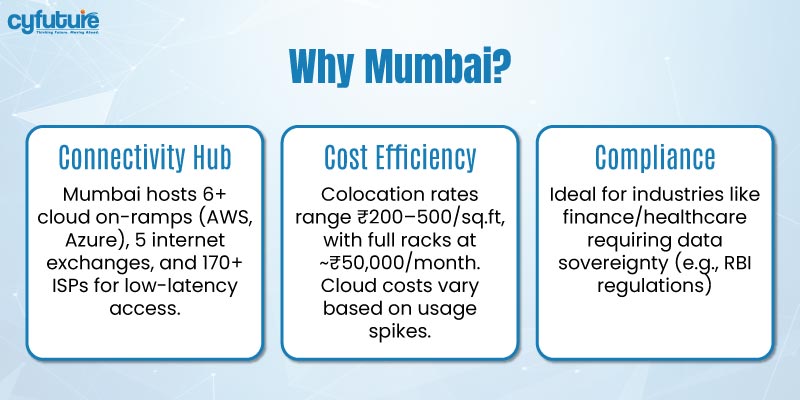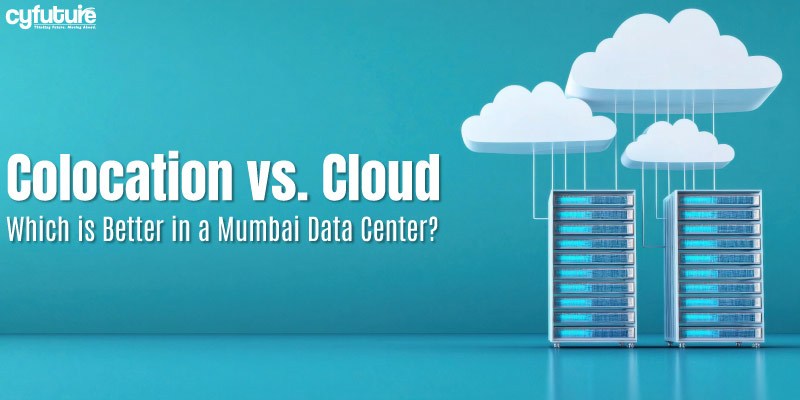 1100 Views
1100 Views
In the rapidly evolving digital economy of India, businesses are increasingly dependent on robust IT infrastructure to maintain uptime, ensure security, and drive growth. For companies operating in or around Mumbai—the financial capital of India—choosing the right hosting strategy is critical. The debate often boils down to two popular options: Colocation and Cloud Computing. But when it comes to deploying these solutions in a data center Mumbai, which is the better fit for your organization?
This comprehensive guide compares colocation and cloud hosting to help you make an informed decision tailored to your business goals, technical requirements, and budget. We’ll explore the benefits, challenges, use cases, and cost implications of each, specifically in the context of Mumbai’s booming data center ecosystem.
Understanding the Basics
What is Colocation?
Colocation is a hosting option where businesses rent space for their physical servers and networking equipment in a third-party data center facility. In a data center Mumbai, colocation customers retain ownership of their hardware, but leverage the facility’s power supply, cooling, bandwidth, security, and redundant infrastructure.
Key Features of Colocation:
-
Complete control over hardware
-
Enhanced physical and network security
-
Custom configurations possible
-
Cost-effective for long-term, high-resource deployments
What is Cloud Hosting?
Cloud hosting delivers compute, storage, and network resources virtually via a cloud service provider. Users can scale resources on-demand, pay-as-you-go, and deploy infrastructure across a global or local network of servers. In a Mumbai data center, cloud hosting can be delivered through private, public, or hybrid cloud models.
Key Features of Cloud Hosting:
-
On-demand scalability
-
No hardware maintenance
-
Fast deployment
-
Supports automation and orchestration
Mumbai: A Thriving Hub for Data Centers
Mumbai has rapidly become a preferred location for deploying IT infrastructure due to its:
-
Strategic geographic location near key business districts
-
High network connectivity with subsea cable landing stations
-
Growing tech ecosystem including startups, fintechs, and MNCs
- Favorable government policies and ease of doing business
With several Tier III and Tier IV data centers established across Navi Mumbai, Panvel, and BKC, choosing between colocation and cloud hosting in a data center Mumbai becomes a question of strategic alignment rather than technical limitations.

Colocation in a Data Center Mumbai: Pros and Cons
Pros:
-
Hardware Control
-
-
-
-
Businesses get complete control over the server configurations, which is ideal for companies with legacy applications or specific hardware needs.
-
Cost Efficiency at Scale
-
While the initial investment is high, colocation can be more cost-effective over time, especially for high-performance workloads.
-
Regulatory Compliance
-
Colocation makes it easier for businesses to adhere to data localization and compliance requirements such as ISO 27001, HIPAA, or GDPR.
-
Low Latency
-
Hosting in a local data center Mumbai ensures low latency for end-users and internal teams, improving performance.
-
High Uptime & Redundancy
Cons:
-
Upfront CapEx
-
Requires initial investment in servers, switches, and storage.
-
Management Overhead
-
Needs in-house or third-party IT staff for server maintenance and updates.
-
Scaling Challenges
-
Scaling requires physical upgrades, which can be time-consuming and capital-intensive.
Cloud Hosting in a Data Center Mumbai: Pros and Cons
Pros:
-
Scalability
-
Instantly scale resources based on traffic, demand, or new deployments.
-
Lower Initial Costs
-
Pay only for what you use. Ideal for startups, SMBs, and dynamic workloads.
-
Quick Deployment
-
Launch environments in minutes, not days or weeks.
-
Managed Services
-
Many cloud providers in Mumbai offer fully managed services, reducing your in-house IT burden.
-
Advanced Tools
-
Access to analytics, AI/ML services, automation, and DevOps tools.
-
Disaster Recovery
-
Built-in backup and disaster recovery options are more seamless and cost-efficient.
Cons:
-
Vendor Lock-In
-
Migration between cloud platforms can be complex and costly.
-
Less Hardware Control
-
Ideal for most use cases but not suitable for specialized hardware requirements.
-
Variable Costs
-
Costs can fluctuate with usage, sometimes leading to bill shock without careful monitoring.
Use Cases: When to Choose What?
Choose Colocation If:
-
You have already invested in enterprise-grade servers and hardware.
-
Regulatory compliance requires physical control of data.
-
Your applications demand custom server configurations.
-
You need predictable monthly costs for budgeting.
-
You require very low latency in Mumbai-based operations.
Choose Cloud Hosting If:
-
You need to deploy applications quickly.
-
Your business experiences variable or seasonal workloads.
-
You have a remote workforce or serve a distributed user base.
-
You prioritize agility, scalability, and automation.
-
You are launching new apps or digital services with unknown resource demands.
Hybrid Approach: Best of Both Worlds?
For many organizations, especially in fast-moving sectors like finance, e-commerce, and media, a hybrid model makes the most sense.
A hybrid cloud-colocation solution in a data center Mumbai allows:
-
Mission-critical or legacy systems to reside in colocation
-
Web apps, mobile platforms, and analytics to scale dynamically in the cloud
-
Unified management through APIs and cloud-native tools
-
Enhanced business continuity with multi-site redundancy
Cyfuture integrated infrastructure solutions support hybrid configurations, providing you with flexibility, performance, and security—right from Mumbai.
Cost Comparison: Colocation vs. Cloud in Mumbai
Colocation (Monthly Estimate):
| Parameter |
Cost Estimate (INR) |
| Rack Space (per U) |
₹5,000 – ₹8,000 |
| Power (per kVA) |
₹10,000 – ₹15,000 |
| Network Bandwidth |
₹3,000 – ₹6,000 |
| Maintenance & Staff |
Variable |
| Total (Approx.) |
₹25,000 – ₹60,000/month |
Cloud (Monthly Estimate):
| Parameter |
Cost Estimate (INR) |
| Small VM |
₹3,000 – ₹7,000 |
| Medium VM |
₹8,000 – ₹15,000 |
| Large VM |
₹20,000 – ₹50,000 |
| Storage |
₹1/GB/month |
| Data Transfer |
₹3 – ₹10/GB |
| Total (Approx.) |
₹5,000 – ₹80,000/month (Usage-Based) |
Insight: Colocation offers cost predictability, while cloud offers flexibility. For stable workloads, colocation may cost less in the long run. For variable or rapidly changing demands, cloud proves more agile.
Why Choose Cyfuture’s Data Center in Mumbai?
At Cyfuture, we bring together the best of colocation and cloud under one roof, ensuring that businesses in Mumbai don’t have to choose between flexibility and control.
Highlights of Cyfuture’s Mumbai Data Center:
-
Tier-III+ facility with redundant power and network paths
-
Carrier-neutral with high-speed interconnects to all major ISPs
-
Comprehensive security including 24×7 surveillance and biometric access
-
24×7 support and monitoring by certified engineers
-
Green data center initiatives with energy-efficient infrastructure
-
Disaster recovery & backup plans tailored to your business needs
-
Hybrid solutions designed for performance, compliance, and cost-efficiency
Whether you are a financial institution needing strict compliance, a startup looking for scalable infrastructure, or an enterprise planning a digital transformation, our data center Mumbai is optimized to meet your needs.
 .
.
Final Verdict: Colocation or Cloud?
There’s no one-size-fits-all answer. The better option depends on your:
-
Business model
-
Budget constraints
-
Growth strategy
-
Compliance needs
-
Technical preferences
Choose Colocation in a Mumbai Data Center if:
-
You seek control, compliance, and cost stability.
-
You have skilled IT resources to manage infrastructure.
-
Your workloads are stable and predictable.
Choose Cloud Hosting in a Mumbai Data Center if:
-
You value agility, speed, and scalability.
-
You prefer OpEx over CapEx.
-
Your team embraces modern tools like containers, CI/CD, and AI.
Or, choose both with a hybrid model—and let Cyfuture help you design it.
Ready to Elevate Your IT Infrastructure?
Cyfuture offers both colocation and cloud hosting solutions in our state-of-the-art data center Mumbai. Whether you’re modernizing legacy applications or launching the next big app, we have the infrastructure, support, and expertise to power your vision.
Related Posts in This Category

